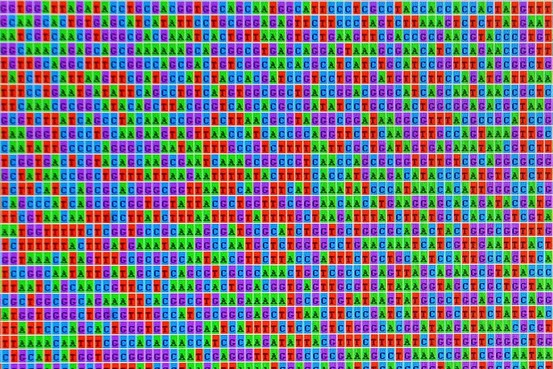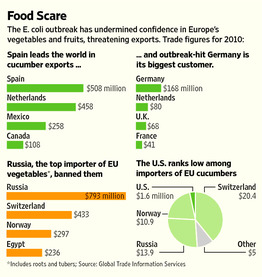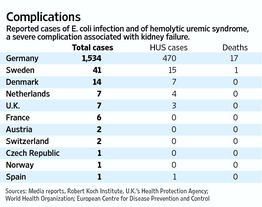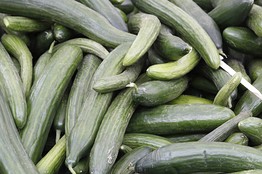
(GENOME OF A KILLER: German and Chinese scientists cracked the genetic code behind the strain(菌株) of Escherichia coli(大肠杆菌) that has killed 18 and sickened more than 1,600. Infected produce is suspected as the source.)
The bacteria that have left 18 dead, sickened hundreds and sparked economic and diplomatic disruptions across Europe are a lethal strain of Escherichia coli that has never been responsible for a human outbreak, health officials said Thursday.
The outbreak is the deadliest in modern history to involve E. coli, and among the top three in terms of the number of people ill. The strain behind the outbreak could have formed from a genetic recombination(基因重组) of two different E. coli bacteria, producing an unusually virulent(致命的) bug, the World Health Organization said Thursday, citing preliminary genetic sequencing data.
According to WHO, of more than 1,600 people sickened by this E. coli strain, 499 developed a rare and potentially fatal kidney-failure(肾衰竭) complication(并发症) known as hemolytic uremic syndrome(溶血性尿毒症综合症)—a complication that can shut down the kidneys and normally occurs in only a small percentage of people sickened during an E. coli outbreak. It is also unusual in that most of those affected are young adults—and mostly women. E. coli infections normally hit young children and the elderly hardest.
"I've never seen this array of virulence(毒性) and antibiotic(抗生素) resistance. It's a very unique combination," Michael Osterholm, director of the University of Minnesota Center for Infectious Disease Research and Policy, said of the strain. But he cautioned that it isn't clear what proportion of people really are developing the severe kidney complication, know as HUS, because it is still unknown how many are actually sick. Some may have milder symptoms and haven't visited a doctor. "We clearly need more information on how many other people got sick," he said.
Underlining the uncertainty, individual reports from around Europe indicate a higher number of the severe cases than WHO reports.
The source of the outbreak, which has hit at least 11 European countries, remained unknown Thursday but authorities believe it comes from infected produce and warned people to avoid eating raw lettuce, tomatoes and cucumbers.
Nearly all the sick people either live in Germany or recently traveled there. Two people who were sickened are now in the U.S., and both had recently traveled to Hamburg(汉堡), where many of the infections occurred. But the infections don't appear to be spreading beyond people who live in or have traveled to Germany, and don't appear to be spreading from person to person, said Robert Tauxe, foodborne diseases(食源性疾病) expert at the U.S. Centers for Disease Control and Prevention. The likelihood that infected produce would reach the U.S. is low, he added.
E. coli, which mostly spreads through contact with infected feces(粪便), isn't typically an airborne infection. In the majority of cases, human infection comes from contaminated food or water. It can also be transmitted through contact with infected people or animals.
As the world's biggest importer of vegetables, at $6.6 billion in 2010, Germany is particularly vulnerable to food infections, say trade analysts. The U.S. is the world's second biggest importer, at $6.5 billion in 2010, of which most comes from Mexico.
The U.S. Food and Drug Administration has stepped up inspections of produce imported from countries reporting illnesses, as well as those that may be potential sources. Products found to be contaminated will be refused admission into the U.S. and future shipments will be detained(扣留) upon entry(入境), an FDA spokesman said.
No shipments of fresh tomatoes, cucumbers or lettuce have been imported from Germany since January, while only a few cases have arrived in the past 18 months from Spain, Dara Corrigan, the FDA's associate commissioner for regulatory affairs, said in an emailed response to questions.
Two-thirds of the $179.7 million in vegetables the U.S. imports from the EU each year is pre-packaged frozen vegetables. But the U.S. is also a buyer of relatively small amounts of niche fresh produce, such as Belgian lettuce, Dutch tomatoes, French onions and Spanish cucumbers.
Whole Foods Market Inc., the upscale supermarket chain, said the only European produce it is buying for its stores nationally now are organic red bell peppers(红甜椒) from Holland. The peppers will stay on the shelves, said Libba Letton, a Whole Foods spokeswoman. "We feel pretty comfortable, because organic produce is so tightly regulated," she said.
The European vegetable industry is reeling from public fears about the outbreak, as well as prompting a diplomatic spat between Spain and Germany about who is to blame.
Russia on Thursday banned all fruit and vegetable imports from the EU, and Spanish politicians continued to call for compensation from Germany, which pointed at Spanish cucumbers as the E. coli source last week. Hamburg city health officials on Tuesday backtracked(改变声明), saying the Spanish cucumbers weren't the source, but some health experts noted that pinpointing or exonerating(宣布无罪,免除责任) a source is difficult when it comes to produce because it may be linked to one field or harvest and perishes quickly.
Spain's Prime Minister Jose Luis Rodriguez Zapatero on Thursday criticized the backlash(强烈抵制) against Spanish products, and Spanish farmers dumped more than 600 pounds of produce on the doorstep of Germany's consulate in Valencia.
The EU described Russia's decision to ban imports of fresh vegetables from the bloc as "disproportionate." The European Commission plans to demand an explanation from the Russian authorities, a spokesman said. No fatalities or infections have been reported in Russia.
The price of cucumbers in Europe has dropped to 5 to 7 eurocents a piece from 20 cents a few weeks ago, according to those who follow the industry. The total production value of fruits and vegetables in the EU is $70 billion, and the total economic value of the supply chain is $170 billion, according to Freshfel, a Brussels-based trade group representing the EU fresh produce industry.
The crisis "is seriously damaging the image of fresh produce and operators across the chain are confronted by a market standstill leading to severe losses," Freshfel said.
Still, it is difficult to know what the long-term economic impact might be. "As things stand, we do not know how far the disease will spread," said Thorsten Polleit, an economist with Barclay's Capital in Germany. "If it doesn't spread beyond the current state of affairs, I would say the economic damage should remain fairly contained," he said.




